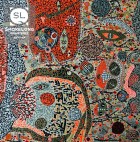Wow—first, what an excellent piece of flash fiction. It hits so many chords desired in the genre. It is full of thoughtful choices. Sometimes our choices as writers matter more than others—many are deliberately literary, and others are modes of transportation for the narrative. I’d like to ask questions around some of these choices, but first, tell us your favorite book or short story, favorite author, or inspiration for this story.
Thanks so much for the kind words. I’m not sure that I have a single favorite author or story, but I do worship Joy Williams, Mary Gaitskill, and J.D. Salinger. I’m drawn to people that act according to their own, somewhat unhinged, internal logic and these writers tend to create characters that are simultaneously aloof, discourteous, erratic, and sincere. I prefer to read and write about people who struggle to strike a balance between internal and external realities, so I’m inspired by characters who are displaced in their own lives.
You made the decision to write almost peripherally, especially at the beginning. It’s almost as if it’s Mark’s story. We know by the end that it certainly isn’t. The line “He has a knack for seeing where things aren’t,” stands out upon a second read—it’s almost as if the narrator wants to believe this of Mark, but in this line she reveals her unreliability. Can you tell us about these narrative choices?
I have a habit of writing somewhat evasive first-person narrators, and I think I’m more interested in telling stories from the peripheries. In a way, it’s almost difficult for me to write direct prose, which means I have the most trouble with action and dialogue. (The latter half of this story necessitated a lot of action, which was good practice for me!) I try to write stories and characters that accommodate and alchemize my need for ambiguity, and the narrator’s unreliability is likely a symptom of this.
There is a ton of symbolism packed into this short piece: the knife, the cutting of the finger, the cut up wooden table, the tarnished and hollow trophies, among others. They all relate back to the sense of loss and transient state the narrator finds herself in. What piece of symbolism do you hope the reader most understands from the story?
I wanted to take an extreme setting and fill it with useless, hollow objects that take on weight through the personal or spiritual significance they hold for each of the two characters. Mark has a knife and a beat up old table to “punish.” He is attracted to the golden trophies not for what they represent, but for what they might be worth. The narrator is largely living in Mark’s empty, disposable world, save for the plastic cross she brings with her to each new place they squat in. The cross is not so much a vessel for religious symbolism as it is a charm she carries to remind her of her childhood home and the home her baby might have lived in.
The pacing of the story is perfect. The reader is as struck by the sudden episode of grief as much as the narrator is. It’s part of what makes this piece so brilliant. What can you tell our readers about your writing process and how it relates to this story?
This question made me laugh, because my process in writing this particular story was completely unlike my usual writing process. Normally, I am infernally slow and spend ages deliberating over every word and sentence. With “Knife Game,” I got the images and main idea while driving home from a night class and started dictating sentences into my notes with Siri before I even got home. I think I finished the story the next day, edited it over a few more days, then submitted it that same week. SmokeLong accepted it the following week, so this story had the fastest all-around turnover of anything I’ve ever written. I wish they were all like that!
Is there anything else you’d like the readers to know about yourself (like any upcoming publications or events), the story itself, or writing?
I’ve taken a bit of a break from submitting the past couple months in order to crack down on writing and editing new stories, so unfortunately I don’t have any exciting new publications to plug just yet. In cliché fashion, I’ll be back on the Submittable grind by the start of the new year. I’m sure I’ll be sending out a ton of flash!



 The SmokeLong Grand Micro Contest (The Mikey) is now an annual competition celebrating and compensating the best micro fiction and nonfiction online.
The SmokeLong Grand Micro Contest (The Mikey) is now an annual competition celebrating and compensating the best micro fiction and nonfiction online.